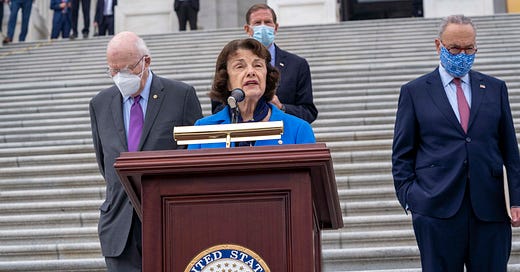The Gerontocracy Must Die
Ceding power to the next generation is an act of love. Why won't anyone do it?
Dianne Feinstein has been one of California’s two U.S. Senators since 1992. In 1992, when she was elected, I was two years old and Feinstein was 59. I am now 32 and Feinstein is 89 — soon to be 90. Feinstein is also, as has been widely reported and exhaustively documented, effectively senile, and unable to perform the basic executive functions of her job. For the past six weeks or more, Feinstein has been absent from the Senate after catching shingles in late February, which has created a major crisis for Democrats as they try to confirm the gigantic backlog of Biden’s judicial nominees. The GOP, of course, is milking this for all it’s worth — denying a request by Feinstein (or her office, more accurately) to temporarily step down from her spot on the Judiciary Committee in order to let the body get back to work. There is no timeline for her to return to work.
This situation is a particularly acute symptom of a greater disease that has plagued American politics for centuries: Everyone in power is old as dirt. This observation is both objectively true (the average age of U.S. senators is 65.3 years) and easy to ignore, as it has basically always been this way, and is often brushed aside by thin accusations of “ageism.” Average and median ages are also an imperfect measurement of how bad things have gotten, as committee assignments like Feinstein’s mean power is not evenly distributed among members of any certain body. The olds and super-olds still hold the keys to power, and boy do they love to keep those gates slammed shut.
Keep reading with a 7-day free trial
Subscribe to Discourse Blog to keep reading this post and get 7 days of free access to the full post archives.





